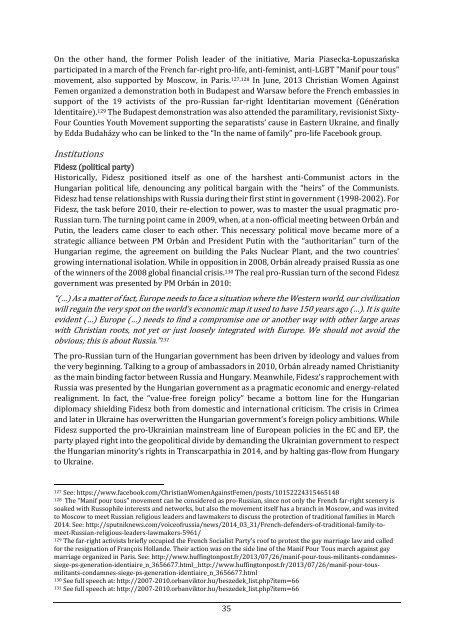to Central Europe
PC_reactionary_values_CEE_20160727
PC_reactionary_values_CEE_20160727
Create successful ePaper yourself
Turn your PDF publications into a flip-book with our unique Google optimized e-Paper software.
On the other hand, the former Polish leader of the initiative, Maria Piasecka-Łopuszańska<br />
participated in a march of the French far-right pro-life, anti-feminist, anti-LGBT "Manif pour <strong>to</strong>us"<br />
movement, also supported by Moscow, in Paris. 127,128 In June, 2013 Christian Women Against<br />
Femen organized a demonstration both in Budapest and Warsaw before the French embassies in<br />
support of the 19 activists of the pro-Russian far-right Identitarian movement (Génération<br />
Identitaire). 129 The Budapest demonstration was also attended the paramilitary, revisionist Sixty-<br />
Four Counties Youth Movement supporting the separatists’ cause in Eastern Ukraine, and finally<br />
by Edda Budaházy who can be linked <strong>to</strong> the “In the name of family” pro-life Facebook group.<br />
Institutions<br />
Fidesz (political party)<br />
His<strong>to</strong>rically, Fidesz positioned itself as one of the harshest anti-Communist ac<strong>to</strong>rs in the<br />
Hungarian political life, denouncing any political bargain with the “heirs” of the Communists.<br />
Fidesz had tense relationships with Russia during their first stint in government (1998-2002). For<br />
Fidesz, the task before 2010, their re-election <strong>to</strong> power, was <strong>to</strong> master the usual pragmatic pro-<br />
Russian turn. The turning point came in 2009, when, at a non-official meeting between Orbán and<br />
Putin, the leaders came closer <strong>to</strong> each other. This necessary political move became more of a<br />
strategic alliance between PM Orbán and President Putin with the “authoritarian” turn of the<br />
Hungarian regime, the agreement on building the Paks Nuclear Plant, and the two countries’<br />
growing international isolation. While in opposition in 2008, Orbán already praised Russia as one<br />
of the winners of the 2008 global financial crisis. 130 The real pro-Russian turn of the second Fidesz<br />
government was presented by PM Orbán in 2010:<br />
“(…) As a matter of fact, <strong>Europe</strong> needs <strong>to</strong> face a situation where the Western world, our civilization<br />
will regain the very spot on the world’s economic map it used <strong>to</strong> have 150 years ago (…). It is quite<br />
evident (…) <strong>Europe</strong> (…) needs <strong>to</strong> find a compromise one or another way with other large areas<br />
with Christian roots, not yet or just loosely integrated with <strong>Europe</strong>. We should not avoid the<br />
obvious; this is about Russia.” 131<br />
The pro-Russian turn of the Hungarian government has been driven by ideology and values from<br />
the very beginning. Talking <strong>to</strong> a group of ambassadors in 2010, Orbán already named Christianity<br />
as the main binding fac<strong>to</strong>r between Russia and Hungary. Meanwhile, Fidesz’s rapprochement with<br />
Russia was presented by the Hungarian government as a pragmatic economic and energy-related<br />
realignment. In fact, the “value-free foreign policy” became a bot<strong>to</strong>m line for the Hungarian<br />
diplomacy shielding Fidesz both from domestic and international criticism. The crisis in Crimea<br />
and later in Ukraine has overwritten the Hungarian government’s foreign policy ambitions. While<br />
Fidesz supported the pro-Ukrainian mainstream line of <strong>Europe</strong>an policies in the EC and EP, the<br />
party played right in<strong>to</strong> the geopolitical divide by demanding the Ukrainian government <strong>to</strong> respect<br />
the Hungarian minority’s rights in Transcarpathia in 2014, and by halting gas-flow from Hungary<br />
<strong>to</strong> Ukraine.<br />
127 See: https://www.facebook.com/ChristianWomenAgainstFemen/posts/10152224315465148<br />
128 The "Manif pour <strong>to</strong>us" movement can be considered as pro-Russian, since not only the French far-right scenery is<br />
soaked with Russophile interests and networks, but also the movement itself has a branch in Moscow, and was invited<br />
<strong>to</strong> Moscow <strong>to</strong> meet Russian religious leaders and lawmakers <strong>to</strong> discuss the protection of traditional families in March<br />
2014. See: http://sputniknews.com/voiceofrussia/news/2014_03_31/French-defenders-of-traditional-family-<strong>to</strong>meet-Russian-religious-leaders-lawmakers-5961/<br />
129 The far-right activists briefly occupied the French Socialist Party’s roof <strong>to</strong> protest the gay marriage law and called<br />
for the resignation of François Hollande. Their action was on the side line of the Manif Pour Tous march against gay<br />
marriage organized in Paris. See: http://www.huffing<strong>to</strong>npost.fr/2013/07/26/manif-pour-<strong>to</strong>us-militants-condamnessiege-ps-generation-identiaire_n_3656677.html<br />
http://www.huffing<strong>to</strong>npost.fr/2013/07/26/manif-pour-<strong>to</strong>usmilitants-condamnes-siege-ps-generation-identiaire_n_3656677.html<br />
130 See full speech at: http://2007-2010.orbanvik<strong>to</strong>r.hu/beszedek_list.php?item=66<br />
131 See full speech at: http://2007-2010.orbanvik<strong>to</strong>r.hu/beszedek_list.php?item=66<br />
35


